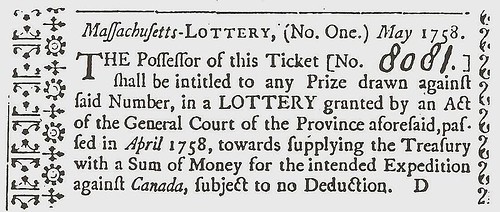
PREV ARTICLE
NEXT ARTICLE
FULL ISSUE
PREV FULL ISSUE
COLONIAL AMERICAN LOTTERY TICKETSColonial-era lottery tickets are a fascinating area to collect and study. While not strictly numismatic, they are akin to colonial paper money, produced by many of the same printers and using the same materials. Pablo Hoffman passed along this April 21, 2017 Atlas Obscura article. Thanks. -Editor  IN THE LATE 19TH CENTURY, Ainsworth Rand Spofford, the sixth Librarian of Congress, went looking through America’s early newspapers for the the earliest notice of a lottery he could find. What he found had been published in February 1720, in the American Weekly Mercury. This lottery was not the colonies’ first, Spofford cautions—only the first for which he could find a printed notice. The ad promised 350 tickets would be sold, for 20 shillings a piece. The prize? “A new brick house, corner of Third and Arch,” in Philadelphia. As Philadelphia came to surpass Boston as the colonies’ largest city, its growth was funded in no small part by lotteries. “It was looked upon as a kind of voluntary tax for paving streets, erecting wharves, buildings, etc., with a contingent profitable return for such subscribers as held the lucky numbers,” wrote Spofford in 1893. Philadelphians used lotteries to build a battery on the Delaware River to defend the city, span creeks with bridges, and fund roads that led from the countryside into the city. But it was far from the only city in the American colonies that depended on people’s willingness to try their luck. In the 17th and 18th centuries, lotteries were a thriving business, both public and private, and without them, early America couldn’t have been built. When the colonies revolted against the crown, lotteries helped the new United States of America survive. In 1776, the Constitutional Congress held one to benefit the soldiers of the Revolution. (Since the value of the new country’s currency was fluctuating wildly, it was less successful than hoped.) Once the colonies won the war, the new states leaned heavily on lotteries to raise revenue, in part because they were not eager to tax newly independent citizens who’d just rebelled against taxation by a central authority. Lotteries funded the growth of the country’s earliest colleges, including the College of New Jersey (later Princeton), Dickinson College, Harvard, and Yale, of many, many churches, and of iconic buildings, including Boston’s Faneuil Hall, which needed to be rebuilt after it burned down in 1761. To read the complete article, see: Wayne Homren, Editor The Numismatic Bibliomania Society is a non-profit organization promoting numismatic literature. See our web site at coinbooks.org. To submit items for publication in The E-Sylum, write to the Editor at this address: whomren@gmail.com To subscribe go to: https://my.binhost.com/lists/listinfo/esylum All Rights Reserved. NBS Home Page Contact the NBS webmaster 
|